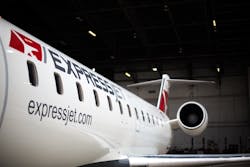Ask talent acquisition leaders in America’s $70 billion aviation maintenance and manufacturing industry what has their attention nowadays, you’re likely to get two short, and very cryptic, answers: “talent shortage” and “skills gap.”
Let’s take them in turn. First, the shortage: In commercial aviation, a 2016 report by the Boeing Company estimates a global need for 617,000 pilots, 679,000 airline maintenance technicians and 814,000 new cabin crew over the next 20 years. Subsequently, over the same period in North America, 112,000 pilots, 127,000 airline maintenance technicians, and 151,000 cabin crew will be needed. Comparable forecasts in business aviation paint a similar picture.
As for skills, the increasing complexity of the newest generation of aircraft has exposed a gap between the skills aviation personnel are generally taught and the skills employers now need in their workforce. “I hold an A&P license,” said an airline maintenance executive, “and I know that the training I received to get that license would not prepare people to perform today’s aviation maintenance technician roles.” This skills gap appears to beg three questions for the aviation industry: Who will make its planes? Who will fly them? Who will maintain them?
For its part, Atlanta-based ExpressJet Airlines sees opportunity in these challenges. ExpressJet, employs about 6,200 people of which just under 25 percent are maintenance personnel. The company operates 10 maintenance bases to support its fleet of more than 270 aircraft serving over 170 airports.
ExpressJet’s fleet offers some clues about the company’s talent acquisition requirements. Ever mindful of its competitive environment, ExpressJet operates modern regional jets built using advanced manufacturing methods and equipped with state-of-the-art computerized avionics.
The link between ExpressJet’s business plan and its talent acquisition objectives is clear. Competitive advantage accrues to airlines able to exploit technology to reduce maintenance costs while increasing capacity utilization.
Maintaining a close connection between its business objectives and the quality of its workforce is motivating ExpressJet to explore new avenues for acquiring its talent. Notable in ExpressJet’s approach is how the company translates the vitality and can-do attitude of its employees into benefits for its customers. An introductory video on the company’s website (www.expressjet.com) neatly makes the business case for maintaining a workforce that “…takes ownership in everything (it does), driven by a belief in getting the job done right because anything else is unacceptable.”
ExpressJet’s talent acquisition strategy is also shaped by the company’s view of its position in the industry. The company sees itself both as a consumer and supplier in the aviation industry talent supply chain, a realistic recognition that regional carriers provide a pipeline of talent for mainline carriers.
It’s also a crucially important business reality to acknowledge in a talent market where absolute numbers of job candidates may be declining. There's a widespread view that when it comes to acquiring talent,if employers cannot get enough of what they need, they must get the best of what’s available.
Meeting a Nationwide Need for Talent with a National Talent Supply Chain
With its international service footprint (ExpressJet serves North America and the Caribbean), and facing industry talent shortage and skills gaps, ExpressJet sought a national partner to help it to source talent nationally and increase its pool of qualified talent providers.
In late 2016, ExpressJet approached the Talent Solutions Coalition (TSC) for assistance. Headquartered at the National Center for Aviation Training in Wichita, KS, TSC (talentsolutionscoalition.org) functions as a national talent supply chain for the aviation industry. TSC was designed with guidance from numerous national industry leaders and experts in best practices for talent pipeline management.
TSC’s supply chain members are educational institutions and certification organizations which provide industry-recognized training, education, and customized professional assessments and certifications. The opportunity to increase the number of employers they serve, create new professional development opportunities for their faculty, and improve their institutional expertise in partnering with industry are among several of the factors motivating educational institutions to join the coalition.
TSC’s customers are industry associations and individual aviation employers. And, especially important for ExpressJet’s purposes, TSC’s capabilities are not limited to technical personnel. It is retained by employers to help them develop talent supply chains to provide technical, supervisory, managerial, and leadership talent.
Building a National Talent Supply Chain
ExpressJet and the Talent Solutions Coalition are now engaged in their first project to develop a supply chain which produces Advanced Aviation Maintenance Technicians (AMTs) for the company. The first phase of the project is focusing on TechOps, with plans to expand to other functional areas in the future.
Operationally, the project relies on TSC’s group of educational institutions and certification providers located across the country. Together these organizations are coordinating as an integrated supply chain to create an ExpressJet talent solution. The blueprint at the heart of the talent solution is a competency-based job-task analysis (JTA) jointly developed by TSC and ExpressJet. The JTA details ExpressJet’s priorities and requirements in three areas: workplace behaviors, advanced technical skills, and regulatory knowledge.
Importantly, this talent solution blueprint complements — does not replace — existing training content and programs at these institutions. Participating educators, in fact, are using the ExpressJet talent solution as an opportunity to develop new modularized content to enhance existing offerings.
In supply chain terms, TSC functions akin to a manufacturer’s representative. The participating educational institutions serve as ‘talent factories,’ and are asked to deliver education and training programs aligned to the company-specific AMT job-task blueprint.
No single program design is mandated, in fact the goal is to encourage participating educational institutions to play to their strengths. “We don’t tell our talent supply chain partners how to teach,” said an ExpressJet executive. “We impart what we need to be taught in order for their students to become successful employees at our company.”
ExpressJet also requested TSC’s help in creating a company-specific Advanced AMT Assessment, with two goals in mind. First, the certification helps the educational institutions participating in this talent solution to stay aligned to the company’s current and future JTA requirements. Second, it helps ExpressJet reduce its talent acquisition costs by streamlining the recruiting process.
Another distinctive aspect of the ExpressJet-TSC talent solution is the high level of engagement by ExpressJet itself. Senior executives in Maintenance and Human Resources are lending their full support and front-line talent acquisition and maintenance training personnel are deeply involved.
Aware that not all aviation schools may have the resources needed to teach the skills ExpressJet requires in its 21st century workforce, the company is taking steps to support training in computerized avionics and related areas where possible. The company is also making its experienced personnel available to serve as guest faculty where feasible.
Increased employer engagement with educational institutions has long been a goal of workforce development leaders across the industry. ExpressJet’s engagement with TSC in this ‘all boats rise’ approach may well guarantee ExpressJet national recognition as a leader in talent acquisition for the aviation industry.
Clearly, sustained engagement by employers in the design and delivery of talent solutions can help to both develop a higher quality workforce and drive innovations in aviation education and training.
Tim Welsh is Executive Director, Talent Solutions Coalition, TalentSolutionsCoalition.org. Contributors: Sandra Fearon, General Manager, Talent Acquisition and Recruiting, ExpressJet Airlines, and Michael McDaniel, General Manager, Maintenance Training, ExpressJet Airlines





